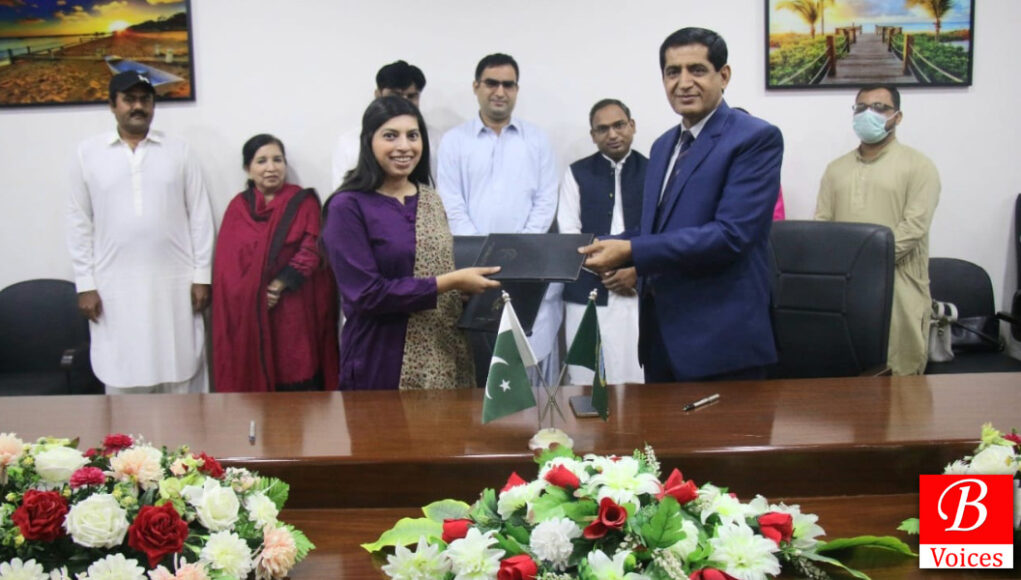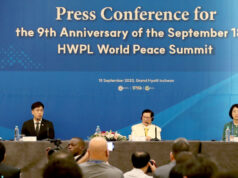Press Release
Uthal: Climate change, droughts, increasing population, and absence of preemptive water management are worsening Balochistan’s water shortage problems. Lasbela University of Agriculture, Water & Marine Sciences (LUAWMS) and Mishal Pakistan (Mishal) pledged to exchange water knowledge resources with multiple key stakeholders in the province while facilitating timely preservation and management of water in Balochistan.
LUAWMS and Mishal documented their partnership by signing a Memorandum of Understanding (MOU) for the project, Water Management Challenges in Balochistan. LUAWMS and Mishal will be bridging the information gap to promote responsible consumption of water among private and public spheres. This initiative will further expand public policy options to improve the current state of water in Balochistan. The project, Water Management Challenge in Balochistan, will be sharing the knowledge coalition platform with multiple key stakeholders in Balochistan, including Government of Balochistan, media, academia, farmers, women and youth associations, civil society, and private sector.
LUAWMS and Mishal will also work together to simplify key information from available data and research findings on the state, consumption and availability of water in Balochistan to enhance general public’s understanding about water. The traditional and social media platforms will be used to distribute information on water and climate change. This media content will bridge the knowledge gap among key stakeholders in the country by informing about the latest agro-technology, climate resilient methodologies, alternative agriculture and livestock farming techniques, preservation, and responsible use of water to attain water security in Balochistan.
Speaking on the occasion, Prof. Dr. Dost Mohammad Baloch Vice Chancellor LUAWMS said that we are excited to work on Water Management Challenges in Balochistan and create the required space for multiple stakeholders to play their part in resolving water challenges. He further added that the knowledge coalition, formed through this project, will help Balochistan design and implement a robust action plan to save and preserve water for present and future generations. He also said that we will assist Mishal in identifying areas for capacity building of key stakeholders by sharing researches being done at LUAWMS.
The population of Balochistan has increased from 6.57 million, as recorded by 1998 Census, to 12.34 million in 2017. Water levels have dropped dramatically in some sections of the province, causing residents to draw water from 1,000 feet below ground level, compared to 200 to 300 feet in the past.
Ms. Shabina Faraz, Award Winner Journalist on Climate Change and CEO of Green Media Initiatives, also joined the knowledge coalition and attended the MOU ceremony. She said that Climate Change is one of the biggest threats to our survival on this planet, especially the area constituting Balochistan. Water Management Challenges in Balochistan, project, is creating the much needed space for knowledge sharing which will help us all in designing and promoting responsible water behavior at public and private levels. We will also be working with the youth of Balochistan and including their valuable perspectives to create sustainable ecosystem for water resources.
The province is an arid territory that is almost totally outside of the monsoon belt, it receives minimal rainfall and suffers from regular droughts, which is detrimental to humans, wildlife, and ecosystems. Climate change is negatively influencing the province’s economy, infrastructure, and social. The gradual changes in climate are leading to the rise in Balochistan’s yearly average temperature.
Amna Sabahat Director Strategy of Mishal Pakistan said, A preliminary assessment of the water situation in Balochistan demonstrates that the federal and provincial administrations need support of all key stakeholders to sustain water resources and prepare for climate change. Civil society, political parties, media, women’s organizations, farmers’ associations, and the people of Balochistan have to work together for responsible commercial and domestic use of water while ensuring legally compliant distribution in the province.
Water scarcity is one of the most significant threats facing society, and changing hydro-climate and socio-economic factors have exacerbated the problem globally. When it comes to Balochistan, Pakistan’s resource-rich but underdeveloped region, water scarcity is the number one concern to the inhabitants. Aside from water scarcity and declining water quality, Balochistan is currently experiencing a drought, which is wreaking havoc on people’s livelihoods, health, and sources of income. With each passing day, almost every section of the country’s largest province is running out of water. The majority of Balochistan’s green areas have converted into deserts over the previous two decades. The province’s water supply is rapidly dwindling in Quetta, Pishin, Killa Abdullah, Kalat, Mastung, Khuzdar, Loralai, and other areas.
Lasbela University of Agriculture, Water and Marine Science (LUAWMS) is located at the heart of China Pakistan Economic Corridor (CPEC) route in Balochistan. LUAWMS is committed to deliver quality higher education, providing innovative research and contributing towards technological advancements to making the world a better place for all. It has been serving the community in the field of Water and Agriculture in particular. In a short span of time it has emerged as a place of excellence in Agriculture, Water and Marine Sciences.
Mishal Pakistan is Pakistan’s leading strategic communication and design company. It is also the Country Partner Institute of the Future of Economic Progress System Initiative, World Economic Forum. Mishal is responsible to generate primary data on more than 150 indicators measuring Pakistan’s competitiveness. Mishal’s foremost domain of activity is behavior change communication, strategic communication with a spotlight on media and perception management.
Share your comments!








